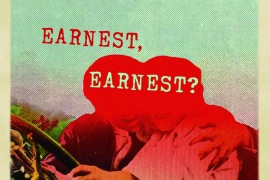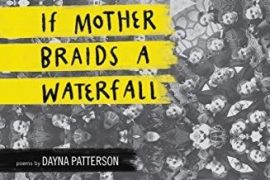All writers at some point in their careers have been told to write what they know best, and often this includes, in some shape or form, portions of their own lives. Poetry in many ways leans heavily toward the personal, so it takes a special writer to blend their own history with that of a historic figure. Dorsey Craft’s debut collection Plunder skillfully weaves the voice of the pirate Anne Bonny with that of a contemporary speaker unafraid to question the status quo, resist narrow conventions, and carve out paths that are as bold as they are promising. The oscillation between the two creates an enthralling read where no subject is off limits: root canals, football, Sex and the City, womanhood, marriage, love, death, and a range of imaginative situations that traverse landscapes and time. With long-lined and lyrical poems, Craft invites readers to “love [the] excess and [the] stillness,” and whether the page jumps from Anne Bonny advising Jane Eyre to the speaker contemplating the women her husband ought to love, Craft does so knowing that a body and mind should never know their place.
Esteban Rodriguez, Interviews Editor
One summer at the beach, my cousin received the most intricate toy pirate ship complete with cannons, sails, a ship’s hold, skulls and cross bones. I don’t remember actually playing with it very much, but I remember being entranced by it and making up stories about the two of us being abandoned pirate children and having actually been found washed up on a beach by our parents. For a time, everything had to be pirates: treasure hunts with a real metal detector, exploring the Provost Dungeon in Charleston, dueling with pistols and swords. I was into the play, but even more excited about imagining the world. And at the same time, I perceived that pirates and pirate play were for boys like my cousin, not for me. This is the center of Plunder because it is the center of my experience with gender: being both inside of and outside of stereotypically masculine and feminine things, enjoying them and feeling them differently.When I heard Anne Bonny’s name as a pre-teen I was delighted to find out about a female pirate, an ancestress, but there wasn’t too much to discover. She was born in Ireland, moved to Charleston, married a pirate and then another pirate, sailed the seas, was imprisoned and sentenced to be hanged. I drifted away from her, and when I came back as an adult-ish poet I felt freed by the sketchy information on her life. The poems in Plunder where she is at a football game or marauding with Jane Eyre come from this freedom. They are also a place for the speaker to imagine a different relationship with gender, one that doesn’t have to be negotiated so carefully, one that she can slash with a cutlass or sail away from over the waves.
The contemporary speaker has to live in the world and move through it as a woman, but Anne Bonny can be as mythical, as larger than life as she needs to be. The tension between these two types of poems made publishing the poems in Plunder interesting, because there are magazines that are attracted to the Anne Bonny series—the lushness of the language, the fantastical atmosphere and manic energy—and then there are other magazines that are much more interested in the analytical, contemporary speaker. I am wildly grateful that both kinds of editors exist in the world, and that Deb Gorlin, who chose Plunder for the May Sarton Prize, is both at once. After I won the prize, I finally had to accept that the book would be out and that I needed to read the poems out loud to myself and really look hard for line-level issues. I made a lot of changes based on where I stumbled over words, or said something different than what was actually on the page. The order of poems was the product of five or six different revision efforts that all provided scaffolding for the finished project. My friend Eleanor Boudreau was always a champion of having the Anne Bonny poems and the speaker poems woven together as opposed to in separate sections. She argued that two voices built off of one another, each giving the other more weight and importance. When I sat down to re-order the manuscript for the last time after a recent round of cuts, I had almost exactly even numbers of Anne poems and speaker poems. So the collection seemed to want what Eleanor wanted.
My hope for this debut is that it provides a foundation for my future work. I’ve always experimented with voice, and Plunder turned out to be a harmony between two voices with some variations thrown in–“Ode to Sex and the City” sounds totally different from “Love Poem with Grease and Silver” and “The Wife’s Lament” is another speaker altogether. Some poems tumble out and have tons of euphony, others are sort of rye and halting in their diction. I see myself continuing with characters and speaking in other voices, but I’m looking to find a register that blends elements from my strongest poems. Anne’s voice is important to me, though, because it allowed me to access an honesty that I hadn’t been brave enough for before this series came along. Filtering my experience through this piratical double was crucial to generating my first collection and even though I’m not writing in her voice any longer, I keep it with me. I hear Anne laughing when I’m taking myself or the world too seriously, I hear her frothing anger at the slightest injustice, feel her lust for fur and gold even when the world overwhelms. The poems I’m writing now are richer because of Anne even as I retire her persona, and I hope to pass the spoils on to more readers in the future.





